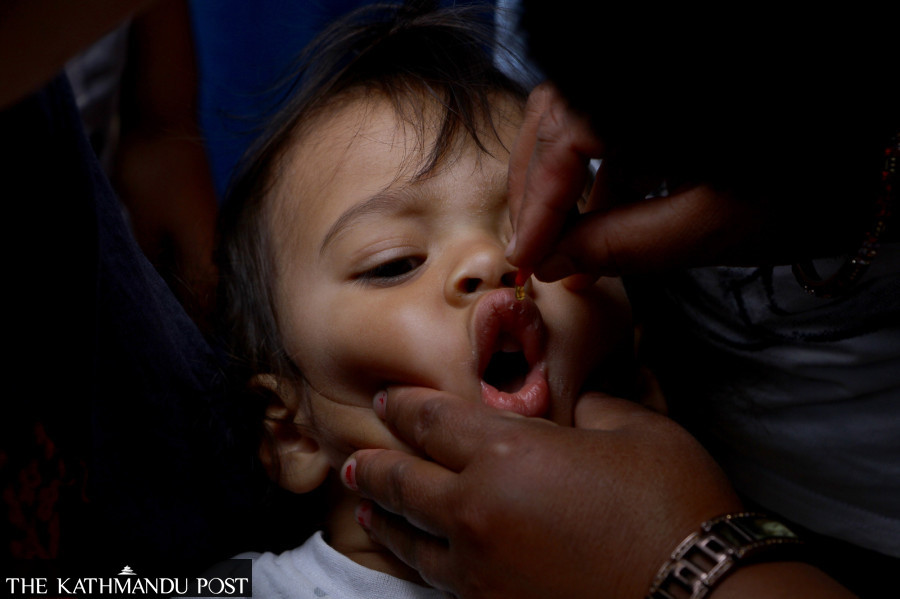Health
Highly contagious poliovirus found in Kathmandu sewage
Authorities scramble for funds to launch a special polio vaccination drive in the Valley.
Arjun Poudel
The poliovirus has been detected in sewage samples collected from Kathmandu, according to the Ministry of Health and Population, which carried out environmental surveillance of highly contagious disease.
Officials concede that the detection of the virus in sewage samples is alarming, as the said disease can cause deformities and paralysis in children.
“Presence of type-3 poliovirus in sewage samples has been confirmed by the National Institute of Health of Thailand, the World Health Organisation’s collaborating centre,” said Dr Bibek Kumar Lal, director at the Family Welfare Division under the Department of Health Services. “We got a confirmation report on Saturday. Type-3 polio virus, which is vaccine-derived, has been detected in sewage samples collected from the confluence of the Tukucha and Bagmati Rivers [in Kathmandu] on May 26.”
Nepal has been polio-free since 2010, but was officially declared polio-free by the World Health Organisation only on March 27, 2014, after maintaining zero polio cases for three consecutive years.
After having zero human cases of polio for about 14 years, the infectious disease has surfaced in the capital city’s sewage, which is a serious problem, according to public health officials.
They said that the presence of poliovirus in sewage samples indicates the looming risk of an outbreak.
Officials at the WHO, however, said there is no need to worry as no one has been found infected with the virus in the country since 2010.
“There is no need to panic, as the virus has been detected only in sewage samples,” said Dr Balbindra Singh, the WHO representative. “Health agencies are taking every precaution to prevent the disease outbreak.”
Officials at the National Public Health Laboratory, the agency that carries out environmental surveillance of poliovirus, said that it took two weeks to process sewage samples. The samples were then sent to the UN agency’s reference laboratory in Thailand for cell culture, as the service is available only in a few laboratories across the world.
The national laboratory collects samples from five tributaries in the Kathmandu Valley and from Koshi, Madhesh, and Gandaki provinces to check for the presence of the polio virus.
Following the confirmation of the virus in the sewage, health authorities scrambled to arrange a budget to launch a special vaccination drive in three districts of the Valley—Kathmandu, Lalitpur, and Bhaktapur.
Officials informed that the United Nations Children’s Fund (UNICEF) and the WHO agreed to provide vaccines and other costs of the campaign, respectively.
“We are launching a four-day polio vaccination campaign in all three districts of Valley from July 24 to 27,” said Dr Abhiyan Gautam, chief of the Immunisation Section at the Family Welfare Division.
“All children under five years of age will be inoculated with an additional dose of oral polio vaccine in the drive.”
An estimated 300,000 children live in three districts of the Valley. Oral polio vaccine, which consists of Type-1 and Type-3 polio virus, will be administered during the campaign, following the detection of Type-3 virus in sewage samples.
Officials said health workers and female community health volunteers will be mobilised in houses, schools, bus parks, and entry points to ensure that no eligible children miss the vaccine.
“We have also stepped up surveillance measures that include collecting sewage samples every week, which we used to collect every fortnight, and taking stool samples of the children having paralysis for testing,” said Gautam. “We have sent some samples to Thailand for testing, and the result is pending.”
Doctors say the polio virus mainly affects children and is usually transmitted through droplets or aerosols from the throat and by faecal contamination of hands, utensils, food and water. Those who do not wash their hands properly, and those who consume contaminated food and water or reside in an area where water and sanitation conditions are poor are at high risk of getting infected with the virus.
The Health Ministry said that the vaccine coverage rate for polio is 95 throughout the country.
Childhood immunisation is the government’s number one priority, under which 13 types of vaccines are given against a range of diseases, including measles-rubella, pneumonia, tuberculosis, diphtheria, pertussis, tetanus, hepatitis B, rotavirus, Japanese encephalitis and typhoid under the regular immunisation programme, free of cost.
Regular immunisation is one of the most successful programmes in Nepal, with a high coverage rate. The country has shown remarkable progress in reducing the under-five mortality rate and the regular immunisation programme is credited with that.




 13.12°C Kathmandu
13.12°C Kathmandu















